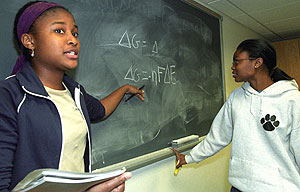Imani Anwisye knows her family and community have served integral roles in her preparation for college and have provided support during her Washington University experience.
Thanks to that support, the St. Louis native plans to attend medical school to understand more about disease and to help lead to a greater understanding of illnesses, not just for the physician, but for the patient as well.

“I’m not under any illusions that it will be simple, but I’ve had so many great examples in my life that have done what others have felt to be impossible, so I feel like I could do no less than to at least try,” Anwisye says.
“No matter what you discover in the laboratory, there will only be a certain percentage of the population that will ever have access to that.
“So on some level, if only on a community-based level, I’d like to work toward minimizing disparities in health-care access.”
|
College of Arts & Sciences |
Growing up in North St. Louis, Anwisye felt science could be the way for her to make her greatest contribution to society. The magna cum laude graduate in biology in Arts & Sciences is well on her way.
Her field of research is bone-cell metabolism, a field she sort of fell into while working at the bone-cell metabolism laboratory at Robert Wood Johnson Medical School in New Jersey during a Research in Science and Engineering Fellowship in summer 2004.
Her thesis research involves the study of bone diseases like osteoporosis in the laboratory of Deborah J. Novack, M.D., Ph.D., assistant professor of internal medicine and instructor in the School of Medicine’s Program in Molecular Cell Biology.
“It’s not what I’d ultimately like to do for a career in research,” Anwisye says. “I want to work on autoimmune disorders such as lupus, but this has been an excellent start, and I’ve had great training in the laboratories here with excellent mentors.”
Her ultimate goal? “I’d like to become a physician-scientist with both a medical degree and doctorate,” she says. “I’d like to approach this challenge of health care on several different levels in research and medicine.”
“Imani has a ‘fire in her belly’ for medicine and research,” says Tavonia Strickland, student support specialist at the University’s Cornerstone: The Center for Advanced Learning. “I have worked with Imani for two years and have found her to be among the brightest, most dedicated students with whom I have ever worked. Indeed, her intellect, initiative, leadership and scholarship are unique.”
During her time at the University, Anwisye has served as a member of the Mortarboard Senior Honors Society and the African Student Association. She is a Howard Hughes Medical Institute Fellow and has worked as a “Biology I” course tutor in Arts & Sciences and academic mentor in general chemistry. She has served as the Black Pre-medical Society’s sophomore representative and co-president.
In 2004, she founded Healing Hands, a program designed to expose undergraduate students to the practice of medicine in the inner city.
In summer 2005, she participated in an intensive three-week medical training program in Tanzania, practicing medicine in the rural areas of that nation.
She was the recipient of this year’s Washington University Women’s Society Leadership Award and the TRIO Student of the Year award.
Anwisye says she has thoroughly enjoyed the University.
“From an academic perspective, I’ve gotten more than I ever anticipated, and not just in the rigor but in the access to academic resources, including the professors themselves,” she says. “I’d say that’s one of the reasons WUSTL is one of the top universities in the world.
“I’ve enjoyed the opportunity to develop my leadership and following skills and the opportunity to meet and learn from some outstanding individuals, be they my peers, maintenance workers or faculty.
“Those bonds have been invaluable and have been a training ground for life, not just in networking, but learning from the unique perspectives of others.”